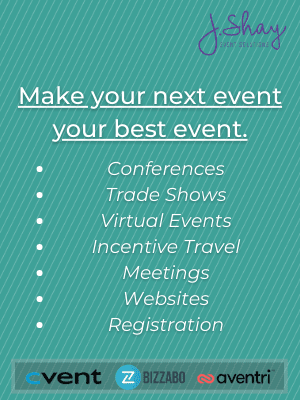As an event planner, you probably spend a lot of your time trying to plan the best event possible around a tight budget. And there are many tricks of the trade that help planners pull this off.
But what if instead of always trying to do the impossible you simply asked for a bigger event budget? What would happen? So many event planners we work with have gotten into a “lack mindset.” They just assume they have to perform a miracle with what they’ve been given. But usually there are ways to get a bigger budget so that you can get even better event outcomes.
Steps to Get a Bigger Budget
Know Exactly What You Need
Want to know a surefire way to NOT get a bigger event budget? Ask for an undefined amount.
Your first step is to absolutely be clear about how much extra money will help you plan a successful event and know exactly where this money will go. So for example, you might need $2,000 more for transportation fees and $5,000 more for a stellar keynote speaker that is sure to draw a crowd. Present these calculations to management so they know that you have an actual plan and reason for asking for more money.
Sell Benefits – Not Features
There is a Golden Rule in advertising that says you must highlight the benefits of your offer, not the features. A car manufacturer is not selling an anti-lock braking system (feature), they are selling peace of mind (benefit).
When asking for more money, you must also be sure to sell the benefits. More money for transportation and an awesome keynote speaker… those are features. But what are the benefits your organization will experience if your budget is bigger? More brand recognition? Higher ticket sales? A better sales kickoff experience, which will lead to more sales during the year? Be specific.
If you don’t paint the picture for them and really highlight benefits, your client or management will have no choice but to focus on cost and cost only.
Help Them See It
It’s important to bring images and video, and even props, to the meeting so your client or employer can see what their money will get them. It can be hard for people who are not professional event planners to visualize what $2500 worth of signage might look like or $7,000 worth of food looks like, or the difference between a $10,000 venue and a $15,000 venue.
Get creative and try and offer your client or employer an experience. Show them videos of the band or keynote speaker. Let them hold and feel potential swag options. Serve some of the food you would like to serve guests. Give them an experience they can’t say no to.
Share the Savings
When asking for a larger budget, it’s always a good idea to share the areas where you are saving your client or employee money. Sharing this information shows you respect their financial position and only want a budget you think their event deserves.
So for instance, earlier I used the example of wanting more money for a notable speaker (feature). This speaker will draw a big crowd (benefit). Now how can you also save some money to make saying yes to a bigger budget easier? Well, you might opt for a cash bar instead of an open bar. Or perhaps you could forego the sit-down meal and replace it with appetizers to cut costs.
When asking for a bigger budget, be sure to point out these savings to them.
Be Prepared to Address Objections
Understand that you will always get objections when asking for more money. Your client or employer wants to spend as little as possible but still get an awesome event. In other words, they are human.
Your job is to walk in there, fully prepared to address any objection they may have. This means you’ll want to spend a bit of time thinking from their point of view to anticipate their pushback. Go through each line item of your budget to identify any potential objections, then get prepared to defend your choices. And don’t forget those BENEFITS!
Use ROI to Get More Event Budget Dollars
Most event planners focus on the logistical and creative aspects of planning corporate events. They don’t think strategically. But it is through strategic event planning, or planning with Return On Investment (ROI) in mind, that planners can show stakeholders the true value of what they do.
Every event has a purpose. Every single one. But many event planners don’t recognize that their efforts have a real, fundamental purpose, and that purpose goes beyond booking flights and ordering the right vegetarian meals.
The BEST WAY we know how to be handed a bigger event budget now and for every event in the future, is for planner to SHIFT their mindset and begin to plan with ROI in mind. Track your event outcomes and analyze the data to see if you hit your targets.
When you hit those desired metrics, you will have solid proof that your efforts directly impacted the company’s bottom line. When you can share this data with your client or employer, and prove that your efforts have helped the company reach its objectives, your team will grow, you’ll get more resources and a bigger budget and be handed more responsibility.
The Wrap
Getting a bigger event budget isn’t hard when you know the steps to take. Have a specific budget in mind, sell benefits – not features, help your client or employee see the event, cut costs where you can, be prepared to meet all of their objections, and, perhaps most importantly, become the kind of event planner that plans with Return on Investment in mind. This will help you showcase the real value you offer.
If you need any help planning an event strategically and tracking key data, please reach out to us. That’s our specialty!
You might also like…
Event Trends We’re Watching in 2024
Greek philosopher Heraclitus is thought to have said, “The only constant is change.” Sounds like...
How Planners Can Tackle New Event Budgeting Demands in 2023
After two years of lockdowns, many event planners are breathing a sigh of relief as the industry...
Corporate Event Trends That Will Set You Apart in 2023
2023 is just around the corner! That means planners have the opportunity to leverage some new...
Event Trends We’re Watching for 2023
If you’ve been in the event planning space for any length of time, you know the planning cycle...
5 Budgeting Tips for Event Planners
As event planners, there are tasks we love doing and those we don’t. Choosing exotic locations,...
Risk Management for Event Planners: The Silver Lining of the Covid Pandemic
Event planners learned something very important over the last two years, and that is the...

J.Shay Team is the generic alias for our event staff that want to submit work anonymously.









